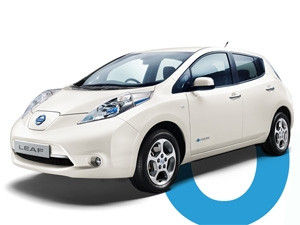
SA's first commercially available fully-electric car, the Nissan Leaf, went on sale yesterday, at the Johannesburg International Motor Show.
The Leaf retails for R446 000 including a three-year/90 000km service plan linked to service intervals of 15 000km. Roadside assistance and a three-year/100 000km mechanical warranty are also included.
Mike Whitfield, MD of Nissan SA, says although the Nissan Leaf carries "a justifiably higher purchase price" than competing C-segment hatchbacks, overall cost of ownership is competitive thanks to the significantly lower price of electricity compared to that of petrol or diesel and the way in which the Leaf is able to harness its power for maximum effectiveness.
He did not elaborate on the local sales target for the vehicles, saying the introduction of the Leaf is about launching new technology and not about numbers. "We have worked alongside the government and the national electricity supplier to ensure the introduction of Nissan Leaf is viable, sustainable and practical.
"This is the car that is starting what will become a new trend in South African motoring. Success in other parts of the world, including Europe and the US, demonstrates that EV [electric vehicle] motoring is a practical solution and that zero emission transport is a reality today. In SA, the adoption of this innovative technology will of course take some time. We will initially release the vehicle in Gauteng, with Cape Town and Durban-based infrastructure to follow in 2014."
Nissan already deployed 10 Leaf cars in SA in May, when they were given to Eskom as part of its research project to study the charging requirements and characteristics of EVs, and to prepare for their entry into the South African market. The Leaf EVs will be managed by Avis as part of its fleet, with Eskom's research to be conducted over a period of three years.
Each Nissan Leaf will be sold with a home charger, which will be installed by specialised technicians in the owner's home upon purchase. Selected Nissan dealers in Gauteng will also provide quick charge stations, which can be used free of charge by Nissan Leaf owners. The charge stations will also be accessible after hours and provide a specialised electric current, which is able to charge the battery pack from empty to 80% in 30 minutes.
The Leaf is powered by a lithium-ion battery that offers a range of up to 195km on a fully-charged battery and delivers a top speed of 144km/h.
No EV roadmap yet
The Leaf's local launch comes despite government electric car incentives not yet having been deployed.
Trade and industry minister Rob Davies announced the electronic vehicle industry roadmap in May, which will be on top of the incentives already in place to reimburse car manufacturers for their investment and bolster the local industry.
Automotive companies can already get 20% back on their investment in car manufacturing. This can be increased to 30% if a manufacturer raises the bar on additional aspects, such as job creation. The EV incentives will allow manufacturers to qualify for an additional 5% if they expand into electric car production, meaning manufacturers could be reimbursed for up to 35% of their total investment costs.
According to Department of Trade and Industry spokesperson Sidwell Medupe, the department has completed its review of the public comment received on the roadmap. "All inputs were considered by the electric vehicle industry steering committee comprising the industry, academia, relevant departments, as well as research and development institutions established to finalise the development of an EV industry roadmap proposal," he says. "The final EV industry proposal is going through an internal evaluation and approval process, and the minister would make an announcement in that regard in due course."
Medupe points out that EVs will not only assist in the reduction of carbon emissions, but will also reduce the high reliance on fuel in the country and protect South Africans against the ever-increasing fuel prices which have a negative impact on the country's economy.
He says while the closing of Optimal Energy, the Cape-based company behind SA's first electric car, the Joule, is of concern to the department, "government is committed to promoting the emergence of an electric vehicle industry in SA and would investigate any viable business case brought forward".
Share